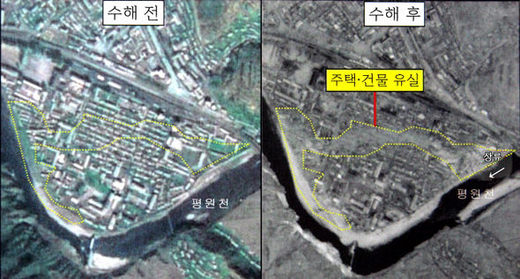 |
|
Satellite photos showing Sinyang, South Pyongan Province, North Korea. The left photo was taken before flooding this summer; the right photo shows the area following the floods. Photo courtesy of the ministry of unification.
|
1.66 million ton deficit warned by unification ministry
North Korea is expected to be more than 1.66 million tons short of food this year, as its crop production will likely decrease due to flood damage following torrential rains last month. The Ministry of Unification in Seoul released a written report to the National Assembly Peaceful Reunification Committee that said, "Due to the first flood damage on July 14 to 16, the communist nation is likely to suffer about 100,000-ton decrease of crop production. Combining this with the second [set of flooding] that happened later last month, North Korea will likely suffer another 100,000 tons of food shortage." The total 1.66 million shortage reflects the North’s previously anticipated food shortage plus the results of the flood damage. Every year for at least the past two decades, North Korea has suffered from chronic food shortage. A food shortage this year of more than 1.66 million tons, estimated by the Ministry of Unification, is more than 700,000 tons higher than last year’s shortage estimate of 960,000 tons. The South Korean government is going to announce the scale and makeup of the aid it will send to North Korea. The announcement is expected sometime this weekend, after a working-level meeting between the Red Cross from the South and North at the North’s Mt. Kumgang (Geumgang) complex tomorrow. Seoul had preliminarily said it would send 100,000 tons of rice, equipment and materials necessary for restoration work, 10,000 sets of emergency relief kits, and blankets to Pyongyang through the Red Cross. The ministry noted, "Due to lack of heavy equipment, North Korea is doing restoration work using human labor. In consideration of the scale of damaged areas, North Korea will need equipment and construction materials of at least five times more than the Yongcheon explosion, referring to a devastating train depot explosion in 2004. It is difficult to ascertain the exact scale of suffering in North Korea, the ministry said, "but it is estimated that heavy rains seriously damaged farmland and infrastructure." North Korea also suffered major casualties from the floods, according to the ministry, though figures are difficult to estimate because of the closed nature of the country. Seoul supported 70 billion won (about US$73 million) in aid to the North after the Yongcheon disaster.





